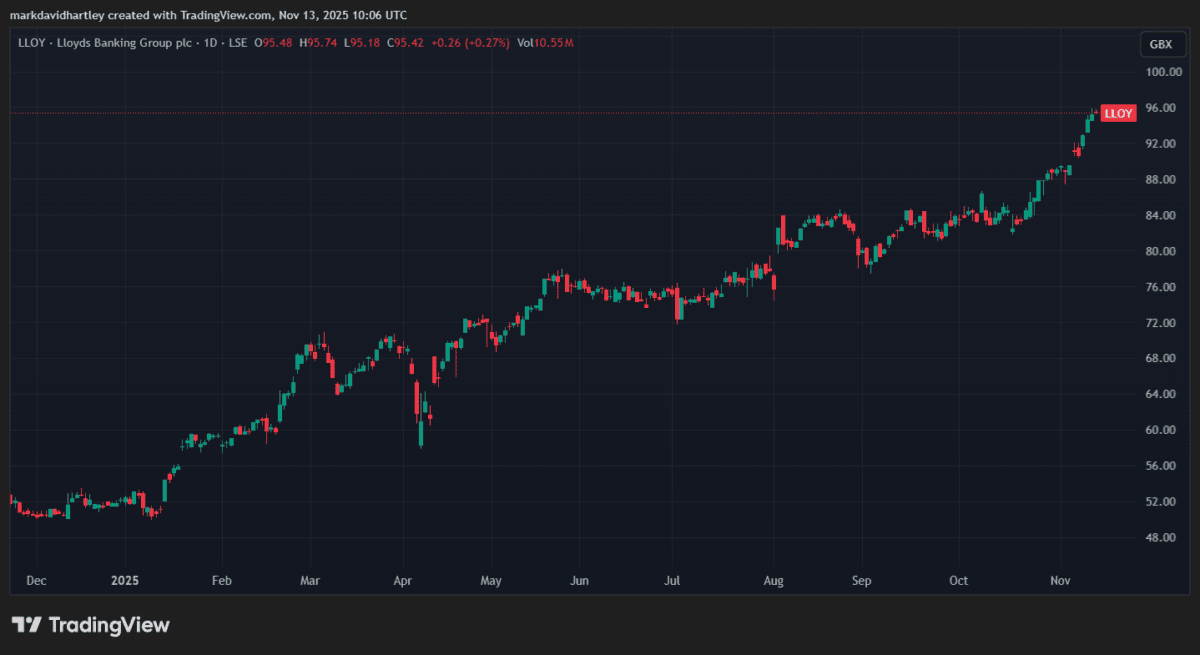
Image source: Getty Images
The last time the Lloyds Banking Group (LSE: LLOY) share price traded above £1 was just over 17 years ago. It’s bizarre to see it near that level again — especially since I remember it was near 50p last Christmas.
If it breaks above £1 before Christmas, it’ll have almost doubled in just one year. That’s relatively unheard of in the UK banking sector.

And it’s not the only one closing in on a significant high. The FTSE 100‘s a mere 1% away from achieving a historic record high above 10,000 points.
But with the UK economy still in a less-than-stable state, is there reason to celebrate?
A stark contrast
Given the current economic landscape, it seems surprising for a domestically-focused bank to do so well. Stubborn inflation, rising debt and possible tax hikes are all factors that should be suppressing growth.
At the same time, it isn’t all that surprising. During periods of economic uncertainty, people often turn to stocks or commodities as a safe haven against currency devaluation. This explains the rise in gold and global markets — but Lloyds may be at risk from other factors.
In this month’s Autumn Budget, Chancellor Rachel Reeves may no longer be expected to raise taxes, but it won’t be a giveaway Budget so whatever measures come in could make it harder for new buyers to afford mortgages. While Lloyds has begun to reduce its reliance on mortgages, they’re still a core part of the business.
So what does this mean for investors going forward?
Pros and cons
Much of Lloyds’ recent growth can be attributed to interest rates and share buybacks. So long as rates remain high, banks will continue to reap the rewards from borrowers.
It’s also achieved an impressive balancing act of paying dividends and buying shares. Over the past two years, it bought back £3.7m worth of shares while keeping its dividend yield above average.
This looks likely to continue for the immediate future, so I suspect the share price will rise above £1 before Christmas.
Risks
There are currently two key events that could derail Lloyds’ progress. If the Autumn Budget introduces any unexpected developments, the impact on the bank could be negative. The Chancellor’s reportedly ruled out a windfall tax on banks but this isn’t guaranteed.
The second is the ongoing probe into car finance mis-selling. Despite the Supreme Court ruling in favour of banks, the Financial Conduct Authority (FCA) is still consulting on a redress scheme. It recently extended the deadline for consultation to 12 December 2025, with affected customers expected to receive an average of £700 per claim.
My opinion
It’s a tough call. While I expect Lloyds will crack £1, I’m not sure it’ll hold the level for long. Investors hoping to buy at a lower level than today might get that chance next year. And it’s not alone – other UK finance stocks may follow a similar pattern.
But I don’t believe chasing price dips is a good investment strategy. From a long-term perspective, Lloyds remains a top UK stock to consider for any type of portfolio. While there are some localised economic risks, it benefits from income, growth and defensive qualities.
For me, that’s a triple-whammy that’s hard to ignore.
